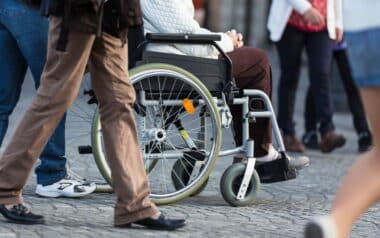The UK’s Department for Work and Pensions (DWP) provides Attendance Allowance to help older individuals cope with additional daily living costs linked to long-term illnesses or disabilities.
This non-means-tested benefit supports people who require care either during the day, at night, or both, depending on the severity of their condition.
According to Manchester Evening News, around 1.7 million people across Great Britain are currently receiving Attendance Allowance, reflecting its role as a key form of support for older adults.
Payments can reach up to £441.60 every four weeks, offering crucial assistance to maintain independence at home.
Financial Support Aimed at Independence
Attendance Allowance is a non-means-tested, tax-free benefit available to individuals over the State Pension age who have a disability or health condition that requires care or supervision. The benefit is paid every four weeks and is currently set at two levels:
- £73.90 per week (£295.60 every four weeks) for those needing help either during the day or at night.
- £110.40 per week (£441.60 every four weeks) for those requiring help both day and night, or those diagnosed as terminally ill.
The increase from the lower to the higher rate represents an additional £36.50 per week, equating to a monthly rise of £146. The money can be used freely by the recipient and often contributes to maintaining independence at home.
When and Why to Report a Change in Condition
The DWP urges recipients to report any changes in their health status, especially if it leads to increased care needs. According to guidance,
It’s crucial not to delay reporting a change in your condition as it could result in increased payments for those currently on the standard rate.
Situations requiring a prompt update include :
- a medical professional advising you have 12 months or less to live,
- developing additional conditions or experiencing worsening symptoms,
- becoming more dependent on physical or mobility support, such as needing a chair to lean on,
- requiring supervision or assistance throughout the night, for example due to mental health conditions, learning difficulties, or sensory impairments (e.g. being deaf or blind).
Other circumstances that must be reported:
- staying in a hospital or care home (provide dates and payment method),
- going abroad for more than four weeks,
- imprisonment,
- changes in immigration status (if not a British citizen),
- changes to name, address, bank details, or healthcare provider,
- choosing to stop receiving the benefit.
You can contact the Attendance Allowance helpline at 0800 731 0122, available Monday to Friday, 8am to 6pm. Additional details can be found on the official GOV.UK website.
Common Conditions Supported by the Benefit
Among the current beneficiaries, arthritis is the most commonly cited condition, accounting for 29% of all claims — representing approximately 483,376 people.
The benefit supports individuals affected by over 48 different health conditions, covering both physical and psychological impairments.
Full List of Supported Conditions :
Arthritis, dementia, Parkinson’s, multiple sclerosis, heart disease, diabetes mellitus, chronic pain syndromes, neurological diseases, learning difficulties, psychosis, motor neurone disease, asthma, blindness, deafness, epilepsy, inflammatory bowel disease, bowel and stomach disease, metabolic disorders, renal disorders, trauma to limbs, malignant disease, AIDS, cystic fibrosis, back pain (non-specified), personality disorders, psychoneurosis, hyperkinetic syndrome, cerebrovascular disease, skin disease, multiple allergy syndrome, deaf/blind conditions, haemodialysis, haemophilia, spondylosis, alcohol and drug abuse, behavioural disorders, blood disorders, peripheral vascular disease, double amputation, traumatic paraplegia/tetraplegia, total parenteral nutrition, terminal illness, frailty, multi-system disorders, and major trauma (non-spinal).
Access and Eligibility
Eligibility is determined based on the level of care or supervision needed, not the diagnosis alone. A person may qualify even if they don’t have a carer, as long as they need assistance or supervision due to their condition.
Applicants must be :
- of State Pension age or older,
- physically or mentally disabled, and
- have needed help for at least six months, unless terminally ill.
The Attendance Allowance is separate from other disability benefits and does not reduce other entitlements. In some cases, it may increase eligibility for Pension Credit, Housing Benefit, or Council Tax Reduction.









